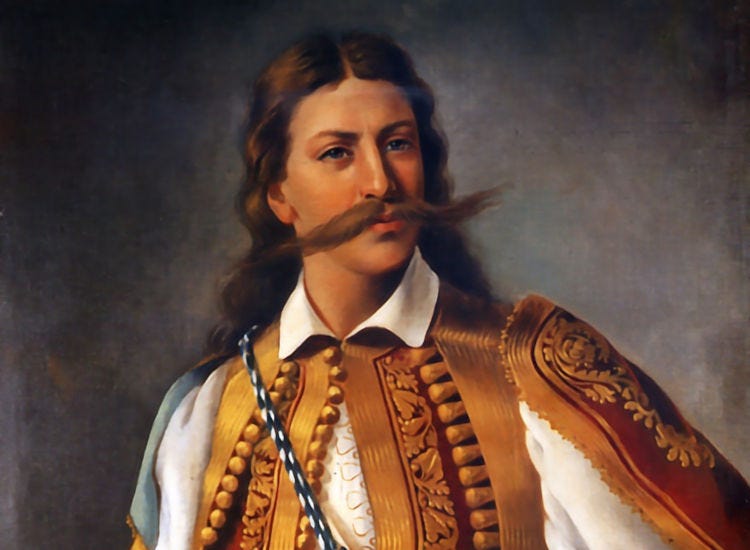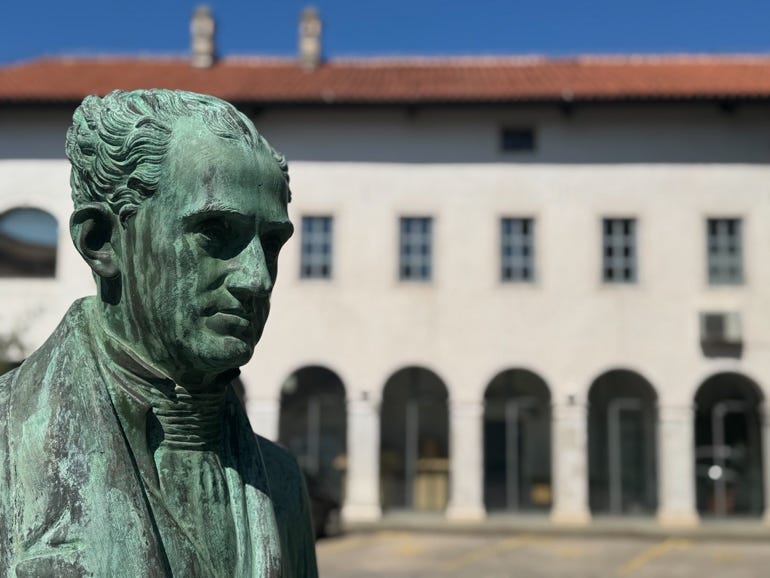Giovanni Antonio Vittori, Conte Capo d’Istria
The first - and last - Governor of Greece
Part 3 - The man who became a legend
You can read Part 2 – Εurope before 1821, here.
ακολουθεί κείμενο στα ελληνικά
You are Konstantinos Mavromichalis. Descended from one of the wealthiest Greek families in the Peloponnese during Ottoman rule. You were among the first initiated into the so called Society of Friends (Filiki Eteria), a secret revolutionary organization aiming to liberate Greece from Ottoman dominion, taking an oath in 1818 to fight “with mind, heart, and body” for Greece. From the onset of the 1821 Revolution, you led key battles against the Turks in places like Valtetsi, Nafplio, and Polyaravos, from which you always emerged victorious. In January 1828, you were among those who welcomed Ioannis Kapodistrias upon his arrival, the first elected Governor of revolutionary Greece.

What could have armed your hand in September 1831 to ultimately kill, alongside your nephew, the man you had welcomed as a Messiah?
With The Chronicle of a Death Foretold, I began intending to describe the circumstances surrounding the assassination of Ioannis Kapodistrias, who was destined to be Greece’s last Governor before the foreign-imposed monarchy. Ultimately, I ended up narrating the history of the modern Greek state within the global geopolitical context of its founding era. Initially, I described the sufferings of the Christian rayads-subjects under the Ottoman Empire and the prominent position the Greeks attained within this system despite numerous difficulties.
Then, with the Lighting the Fuse, we examined how the self-identified Romioi exploited international circumstances from the late 18th century up to the outbreak of the 1821 Revolution to acquire wealth, connections, and—most importantly—a national consciousness, as it began to be understood at that time. Despite the efforts of the Holy Alliance to suppress it, the seeds of the French Revolution and especially the principles of individual and national self-determination had started to blossom.
Whether it's the price of a coffee or a deeper commitment, every contribution matters. Your support directly helps me fund my MA in Humanities, covering the research and resources needed to keep uncovering the past and bringing history, archaeology, and culture to life.
In the latter, we also saw the emergence of Kapodistrias as a politician in the newly established state of the Ionian Islands, effectively the first independent Greek polity since 1453, albeit ultimately a British protectorate. He went on to become Foreign Minister of the Russian Empire, a close associate and advisor of Tsar Alexander I until 1822, when he withdrew to Switzerland due to disagreements with the Tsar over the Greek question.
But who exactly was Ioannis Kapodistrias?
Count Ioannis Antonios Kapodistrias, or Giovanni Antonio Vittori, Conte Capo d’Istria in Italian, was born in Venetian-ruled Corfu in 1776. And naturally, at this point you might wonder why the first Governor of Greece has an Italian name and title. The brief answer would be: since the first king of Greece was German, does an Italian bother you? But things in the world around 1800 were not so simple, and Kapodistrias was not Italian, unlike Otto I who was more German than Hitler himself.
Remember when we said that the term "nationality" was first used around 1810 (now is a good time to review the previous two articles in the series)? The Ionian Islands are a striking example of how complex matters were at the time, having experienced little to no Ottoman rule (except maybe Lefkada) and having been governed by the Venetians from the 13th–15th centuries up until the fall of the Republic of Venice to Napoleon in 1797. That is also why, in the last article, we noted that the Ionian Greek dialect, heavily influenced by Italian, became the lingua franca of Eastern Mediterranean ports in the late 18th century

The Kapodistrias family, or Vittori as their family name was, arrived in Corfu in 1375 from the town of Capo d’Istria, then part of the Venetian Republic, today known as Koper in Slovenia. In 1477, they were registered in the Libro d’Oro (Golden Book) of Corfu, a ledger originally listing the indigenous nobility predating Venetian rule—old Byzantine-origin aristocracy, large landowners, and soldiers (stradioti)—and later also including economically powerful bourgeoisie of each island. These constituted the so-called Greek aristocracy from which those holding administrative roles in the Serenissima Republic and political rights were elected. Following the custom of the time, the surname denoting the Vittori family’s place of origin—Kapodistrias—soon prevailed, and the family converted to Orthodoxy. They acquired vast estates on the island and engaged in politics, while, as befitted nobles of the era, after receiving a classical education, they went on to study at Italian universities.
The father of Ioannis Kapodistrias, Count Antonios-Maria Kapodistrias, was a pupil of Nikiforos Theotokis, a Greek scholar, theologian, physicist-mathematician, and polymath. Before becoming Archbishop of the southern provinces of the Russian Empire, invited by Catherine the Great, Theotokis was highly respected in contemporary Greece as a Teacher of the Nation (Διδάσκαλος του Γένους), since he ran his own school in Corfu called the "Koinon Frontistirion" (Common Tutoring School). There, he taught Greek and Italian literature, grammar, geography, rhetoric, physics, mathematics, as well as philosophy. In 1766, he published in Vienna Physika (Φυσικά), the first printed text to comprehensively introduce and endorse Newtonian physics in the wider Greek-speaking region.
Returning to Antonios-Maria Kapodistrias, who married Diamantina Gonemi of Cypriot aristocratic origin (Cyprus was under Venetian rule until 1571 when it was conquered by the Ottomans), they had ten children, nine of whom survived. Three of these—Ioannis, Viaros, and Augustinos—became involved in politics. Notably, Augustinos briefly participated in the three-member committee that governed the Greek state after his brother's assassination. In 1799, Antonios-Maria was included in the diplomatic committee sent to Saint Petersburg and the Ottoman Porte to secure approval for a constitution, which was successfully obtained. It is worth recalling that the Ionian State (Septinsular Republic) was founded in 1800 as an autonomous state under nominal Ottoman suzerainty and Russian control (have you done that review yet?). In 1800, Antonios-Maria drafted the constitution of the State and was entrusted with its implementation, serving simultaneously as imperial commissioner. In 1801, his son Ioannis replaced him in these duties.
At this point, I feel the need to emphasize that the perhaps exhaustive listing of biographical details is not meant to tire the reader or to prove how effectively the author can gather information from books and the internet, but rather to highlight the complexity of the conditions of the era and the fluidity of national, political, and personal relationships.
Ioannis Kapodistrias, having received his basic education in Corfu, studied Medicine and Philosophy at Padua. He then



